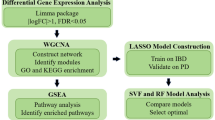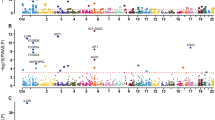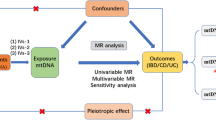Abstract
CARD8 (TUCAN) is implicated in the regulation of apoptosis and inflammation, and is a positional and functional candidate gene for inflammatory bowel disease (IBD). Recent investigations have reported conflicting results of association between a CARD8 nonsynonymous SNP, rs2043211, and IBD. SNP rs2043211 results in an A>T transversion in the CARD8 template strand, which introduces a stop codon polymorphism (Cys10Stop), and genotyping of the Cys10Stop variant revealed that 9% of the control population was homozygous for the ‘Stop’ allele. The effect of the Stop allele on mRNA and protein expression of the two known isoforms of this gene was investigated. IBD patients homozygous for the Stop allele showed somewhat reduced expression of CARD8 mRNA, but, contrary to expectation, expressed a 48 kDa protein isoform. A search of the EST database and reverse transcription-PCR analysis revealed a novel coding exon and three novel CARD8 mRNA isoforms that are conserved in primates. The isoforms of CARD8 differ in their N-termini, resulting in diverse predicted molecular weights (47, 48, 51, 54 and 60 kDa) and multiple outcomes for the variant including Cys10Stop, Cys34Stop, Phe52Ile and Phe102Ile; one isoform may arise through transcription and translation initiated downstream of rs2043211 to yield a novel protein isoform of ∼47 kDa. The multiple isoforms and differing consequences for a predicted stop codon polymorphism underline the importance of detailed analysis of the effects of proposed functional variants on gene expression.
Similar content being viewed by others
Log in or create a free account to read this content
Gain free access to this article, as well as selected content from this journal and more on nature.com
or
References
Hong GS, Jung YK : Caspase recruitment domain (CARD) as a bi-functional switch of caspase regulation and NF-kappaB signals. J Biochem Mol Biol 2002; 35: 19–23.
Hugot JP, Chamaillard M, Zouali H et al: Association of NOD2 leucine-rich repeat variants with susceptibility to Crohn's disease. Nature 2001; 411: 599–603.
Ogura Y, Bonen DK, Inohara N et al: A frameshift mutation in NOD2 associated with susceptibility to Crohn's disease. Nature 2001; 411: 603–606.
Hampe J, Cuthbert A, Croucher PJ et al: Association between insertion mutation in NOD2 gene and Crohn's disease in German and British populations. Lancet 2001; 357: 1925–1928.
Zhang H, Fu W : NDPP1 is a novel CARD domain containing protein which can inhibit apoptosis and suppress NF-kappaB activation. Int J Oncol 2002; 20: 1035–1040.
Pathan N, Marusawa H, Krajewska M et al: TUCAN, an antiapoptotic caspase-associated recruitment domain family protein overexpressed in cancer. J Biol Chem 2001; 276: 32220–32229.
Bouchier-Hayes L, Conroy H, Egan H et al: CARDINAL, a novel caspase recruitment domain protein, is an inhibitor of multiple NF-kappa B activation pathways. J Biol Chem 2001; 276: 44069–44077.
Yamamoto M, Torigoe T, Kamiguchi K et al: A novel isoform of TUCAN is overexpressed in human cancer tissues and suppresses both caspase-8- and caspase-9-mediated apoptosis. Cancer Res 2005; 65: 8706–8714.
Cho JH, Nicolae DL, Gold LH et al: Identification of novel susceptibility loci for inflammatory bowel disease on chromosomes 1p, 3q, and 4q: evidence for epistasis between 1p and IBD1. Proc Natl Acad Sci USA 1998; 95: 7502–7507.
Rioux JD, Silverberg MS, Daly MJ et al: Genomewide search in Canadian families with inflammatory bowel disease reveals two novel susceptibility loci. Am J Hum Genet 2000; 66: 1863–1870.
Duerr RH, Barmada MM, Zhang L, Pfutzer R, Weeks DE : High-density genome scan in Crohn disease shows confirmed linkage to chromosome 14q11–12. Am J Hum Genet 2000; 66: 1857–1862.
Van Heel DA, Dechairo BM, McGovern DPB et al: The IBD6 Crohn's disease locus demonstrates complex interactions with CARD15 and IBD5 disease-associated variants. Hum Mol Genet 2003; 12: 2569–2575.
Van Heel DA, Fisher SA, Kirby A et al: Inflammatory bowel disease susceptibility loci defined by genome scan meta-analysis of 1952 affected relative pairs. Hum Mol Genet 2004; 13: 763–770.
McGovern DP, Butler H, Ahmad T et al: TUCAN (CARD8) genetic variants and inflammatory bowel disease. Gastroenterology 2006; 131: 1190–1196.
Fisher SA, Mirza MM, Onnie CM et al: Combined evidence from three large British Association studies rejects TUCAN/CARD8 as an IBD susceptibility gene. Gastroenterology 2007; 132: 2078–2080.
Franke A, Rosenstiel P, Balschun T et al: No association between the TUCAN (CARD8) Cys10Stop mutation and inflammatory bowel disease in a large retrospective German and a clinically well-characterized Norwegian sample. Gastroenterology 2007; 132: 2080–2081.
The Wellcome Trust Case Control Consortium: Genome-wide association study of 14 000 cases of seven common diseases and 3000 shared controls. Nature 2007; 447: 661–683.
Baker KE, Parker R : Nonsense-mediated mRNA decay: terminating erroneous gene expression. Curr Opin Cell Biol 2004; 16: 293–299.
Cartegni L, Chew SL, Krainer AR : Listening to silence and understanding nonsense: exonic mutations that affect splicing. Nat Rev Genet 2002; 3: 285–298.
Razmara M, Srinivasula SM, Wang L et al: CARD-8 protein, a new CARD family member that regulates caspase-1 activation and apoptosis. J Biol Chem 2002; 277: 13952–13958.
Checinska A, Oudejans JJ, Span SW et al: The expression of TUCAN, an inhibitor of apoptosis protein, in patients with advanced non-small cell lung cancer treated with chemotherapy. Anticancer Res 2006; 26: 3819–3824.
Acknowledgements
This work was supported by the National Association for Colitis and Crohn's Disease (UK), the Guy's and St Thomas' Charity and The Wellcome Trust.
Author information
Authors and Affiliations
Corresponding author
Additional information
Supplementary Information accompanies the paper on European Journal of Human Genetics website (http://www.nature.com/ejhg)
Supplementary information
Rights and permissions
About this article
Cite this article
Bagnall, R., Roberts, R., Mirza, M. et al. Novel isoforms of the CARD8 (TUCAN) gene evade a nonsense mutation. Eur J Hum Genet 16, 619–625 (2008). https://doi.org/10.1038/sj.ejhg.5201996
Received:
Revised:
Accepted:
Published:
Issue date:
DOI: https://doi.org/10.1038/sj.ejhg.5201996
Keywords
This article is cited by
-
Polymorphisms and expression of inflammasome genes are associated with the development and severity of rheumatoid arthritis in Brazilian patients
Inflammation Research (2018)
-
Multiplicative interaction of functional inflammasome genetic variants in determining the risk of gout
Arthritis Research & Therapy (2015)
-
CARD8 is a negative regulator for NLRP3 inflammasome, but mutant NLRP3 in cryopyrin-associated periodic syndromes escapes the restriction
Arthritis Research & Therapy (2014)
-
Association of CARD8 with inflammatory bowel disease in Koreans
Journal of Human Genetics (2011)
-
Combined Polymorphisms in Genes Encoding the Inflammasome Components NALP3 and CARD8 Confer Susceptibility to Crohn's Disease in Swedish Men
The American Journal of Gastroenterology (2009)



